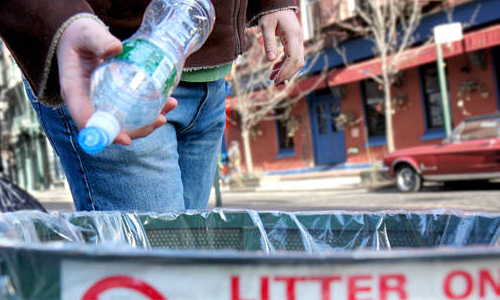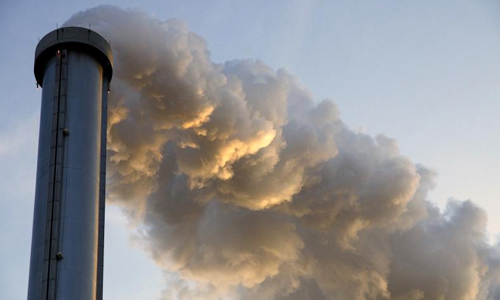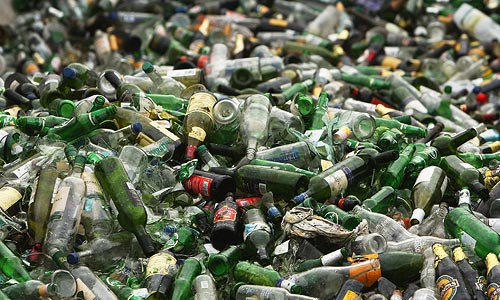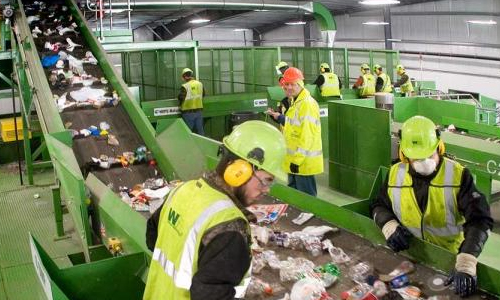BGSU Recycling Program
At BGSU, we partner with Rumpke for our recycling program. we use a single-stream recycling program, otherwise known as a commingled method. This is a system that allows us to place all approved recyclable items into the same recycling bin, instead of being sorted and placed into individual containers. Eventually, commingled recycling is sorted into individual commodities. This takes place at a sorting facility after the loads of commingled recycling are picked up and taken off campus by our recycling vendor.
In order to achieve optimal recycling rates, BGSU has a paired container policy, where recycling and landfill containers are placed side by side. This ensures a user-friendly approach that will help us meet our waste diversion goal. Doing this encourages the community to recycle rather than placing recyclable items in the trash so we can all do our part!
Recyclables should always be ...
Empty
Clean
Loose
Cardboard
- Cardboard Boxes*
- Pizza Boxes (free of food)
- Paper Beverage Cups (empty w/lid removed)
- Coffee Cup Sleeves
- Paper Liquid Cartons
- Cores Paper Towel & Toilet Paper
- Paperboard Food Packages
* Large cardboard should be taken outside to the orange recycling containers.
- Paper Plates & Bowls
- Styrofoam
- Take-Out & To-Go Boxes
- Paper Food Holders
- Dirty Paper Sub Wrappers
- Greasy Pizza Boxes
Paper
- Mixed Office Paper
- Notebook Paper
- Envelopes
- Cardstock
- Butcher Block Paper
- Sticky Notes
- Magazines
- Brochures
- Posters
- Glossy Paper
- Tape (Any Kind)
- Napkins
- Paper Towels
- Tissues (Kleenex)
- Toilet Paper
- Construction Paper
- Laminated Paper
Plastic Bottles
- Pop & Water Bottles
- Plastic Beverage Cups (empty w/straws removed)
- Laundry Detergent Bottles
- Milk Bottles & Jugs
- Shampoo & Conditioner Bottles
- Dairy Product Tubs
- Yogurt & Fruit Cups
- Disposable Lids or Straws (Any Kind)
- Single-Use Plastic Utensils
- Colored Solo Brand Cups
- Fast Food Bowls/Containers
- Food Packaging, Chip Bags, or Candy Wrappers
- Salad Dressing & Ketchup Packets
- Condiment Cups
- Shrink Wrap & Bubble Wrap
- Or Any Other Plastic Packaging or Parts
Aluminum Cans
- Aluminum Beverage Cans
- Steel Cans & Lids
- Tuna & Soup Cans
- Fruit & Vegetable Cans
- Empty Aerosol Cans*
* Remove lids and tips from empty aerosol cans.
- Aluminum Foil
Unbroken Glass
- Bottles
- Food Jars*
- Mason Jars
* metal lids like on salsa jars can be recycled separately as long as removed from the glass jar
- Mirrors
- Lightbulbs
- Broken Glass
- Any Other Glass Item
Newspaper
- Newspaper
- Magazines
- Catalogs
- Posters
- Phone Books
- Paperback Books
- Plastic Coated Magazines
- Coated Finish Paper
The goal of the BGSU Recycling Program is to ...
preserve the environment, educate the BGSU community and conserve natural resources and energy through sound solid waste management practices, and to provide the BGSU community with the best opportunity to recycle.
Contamination (placing items that are not recyclable into the recycling container) is the biggest problem facing the BGSU Recycling Program, but can be lowered/eliminated with your help. Remember, recycling is very region-specific. Just because an item has a recycling symbol or says "recyclable" on it DOES NOT necessarily mean it is recyclable at BGSU.
Our recycling signage states what is and is not recyclable on campus! No one goes through commingled recycling to remove contamination from the recycling; it is up to you. Recycling loads tainted with excessive contamination are declared trash and taken to the landfill – a losing proposition for everyone, especially the environment. Contamination from non-recyclable items is the number one obstacle for commingle recycling.
Contamination occurs when food waste, leftover liquids, or other non-recyclable items are placed into the "Recycling" bin and damages the other contents, making it unable to be recycled. Mixing in non-recyclable items jeopardizes the success of the whole program. Therefore, it is very important for each of us to ensure we are placing the appropriate material (that is also appropriately cleaned out) in the correct bin! If you have questions about certain items, please contact us!
The most common contaiminations are...
Tissue Paper
- Napkins
- Paper Towels
- Tissues (Kleenex)
- Toilet Paper
Lids, Straws and Utensils
- Disposable Lids or Straws (Any Kind)
- Straw and Utensil Wrappers
- Single-Use Plastic Utensils
Plastic Packaging/Bags
- Plastic Food Packaging
- Plastic Bags
- Styrofoam
- Chip Bags and Candy or Food Wrappers
- Salad Dressing and Ketchup Packets
- Condiment Cups
All recyclable items go into the "Orange Recycling" container when taken outside. Only these items are recyclable.
All non-recyclable items go into the "Brown Landfill" container when taken outside.
On-Campus
- Paper, newspaper, cans, plastics, glass, and small cardboard items are all accepted in any commingle bin labeled “Recycle”, located in every building across campus (see What to Recycle tab for more specific information on what is accepted in the recycling bins)
- Large cardboard items can be deposited into large orange, recycling dumpsters found throughout campus, after flattening and removing all packing materials.
- Electronics boxes can be found at numerous locations through campus
- For large recyclable items and scrap metal, contact greenbg@bgsu.edu or bring them to Campus Operations to be recycled
Off-Campus
- Off campus students residing in Bowling Green, are encouraged to take their recyclables to the BG Recycling Center. The BG Recycling Center is open 24 hours and located at 1040 North College Drive, just west of the Wood County Airport. The BG Recycling Center can be reached by calling 1 (419) 352-5446.
- Don't throw recyclables in the trash! Recycling stations are placed throughout campus for your convenience!
Easy! Instead of throwing away your paper, plastics, cans, glass, and cardboard, recycle them! Paper, plastics, cans, and glass are all collected in the same bin labeled “Recycling”; just find a bin and put it in! It is essential that recyclable items are rinsed out and free of residue to avoid contamination. Cardboard can be flattened with packing materials removed, and placed in any large orange dumpster located outside buildings across campus. See “What Should I Recycle” tab for more information on what can be recycled. Any other waste should be placed in the bins labeled “Landfill”.
Reduces Greenhouse Gases
- All materials that go into a landfill stay there for hundreds and even thousands of years before they decompose. Landfill waste generates greenhouse gases, responsible for climate change, including methane. Methane is significantly more harmful than any other greenhouse gas. Some items that are placed into a landfill will actually never fully decompose. Recycling all the materials that we can helps to conserve the amount of landfill space available in the United States while also decreasing the need to build new or expand current landfills
Create Jobs and Industry
- Recycling products creates a wide array of job opportunities and income for Ohio residents. More than 100,000 jobs in Ohio, which is more than landfills provide, are directly dependent on recycling. The recycling industry also generates over $22 billion in sales a year in Ohio alone.
Save Energy and Resources
- Recycling materials to make them into a new product helps to reduce the invasive processing of natural resources. Creating products from recycled materials also helps to conserve energy because there is no need for labor intensive resource processing and extraction. Using recycled aluminum to create cans saves up to 95% of the energy it costs to create a can from virgin natural resources.
It's the Law
- Forty-Four states, including Ohio, have passed legislation forcing the reduction of waste. BGSU currently falls under these laws, and must continually meet state goals on waste stream reduction. House Bill 592 set a goal of reducing the solid waste stream in Ohio by 25% by 1994. Ohio surpassed the expectations of the bill by reaching the goal in the year 1990. In 1995 the goal was revised to reduce the solid waste stream by 50% and increase the recycling objective to 25% by the year 2000.
Batteries
- We have numerous electronics, battery, and inkjet recycling stations across campus - find the one nearest you!
Scrap Metal
- The BGSU Recycling Program accepts scrap metal such as futon frames for recycling. Arrangements for pick-up of material can be made by contacting the Campus Operations Help Desk (419-372-2251) or by submitting an online "Maintenance Request" found in the "Misc. Services" menu of myBGSU.
Still Useable Clothes, Shoes, & Electronics
- There are many local charities, organizations, and business that benefit from these such donations such as Goodwill, Best Buy, and the Cocoon Shelter. You can also contact Campus Sustainability about donating to the BGSU ReStore at greenbg@bgsu.edu.
Broken Electronics
- BGSU recycles all types of electronic items. Does it have a plug or is battery-operated? Submit a "Maintenance Request" found in the "Misc Services" menu in myBGSU.
Ever wonder what happens to your recyclables when you put them in the recycling bin? Where does every piece of paper, cardboard, plastic bottle, soda can, or even glass jar go to? With BGSU's partnership with Rumpke, these co-branded graphics will show you exactly what each item is turned into when recycled!
| Before | After |
|---|---|
| Steel Cans | Car Parts and Appliances |
| Aluminum Cans and Cups | New Aluminum Cans |
| Cardboard and Paper Cups | Corrugated Boxes |
| Mixed Paper | Corrugated Boxes |
| Newspaper | Newspaper and Corrugated Boxes |
| Plastic Bottles (PET) | Plastic strapping, Carpet, Plastic Bottles |
| Plastic Jugs (HDPE) | Drainage Pipe, Plastic Containers, Toys |
| #5 Plastic Tubs | Plastic Containers |
| Glass - Large Pieces | Glass Bottles |
| Glass - Small Pieces | Fiberglass Insulation |
| Cartons and Aeseptic Containers | Tissues and Office Paper |
Updated: 10/29/2025 04:37PM





